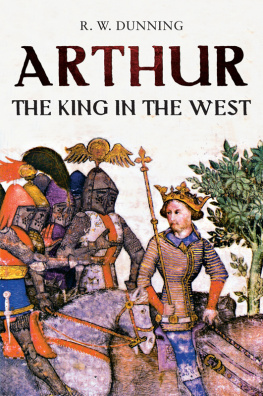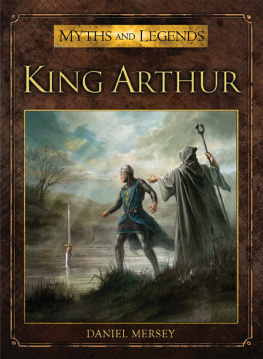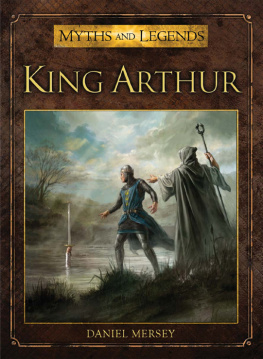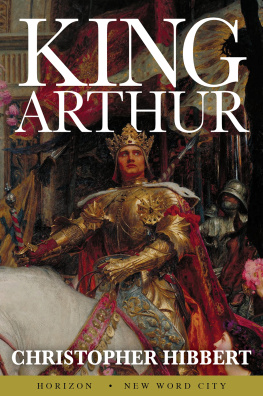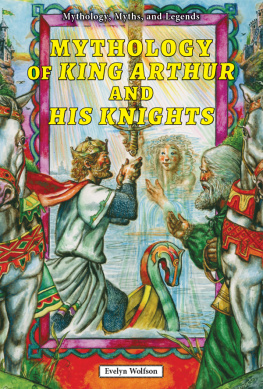
The Medieval Murderers
King Arthur's Bones
The fifth book in the Medieval Murderers series, 2009
Prologue In which Philip Gooden describes how at Glastonbury Abbey in 1191 the remains of King Arthur are believed to have been discovered.
Act One In which Susanna Gregory describes how the bones are stolen during a violent skirmish between the Welsh and the invading Normans.
Act Two In which Bernard Knight relates how in 1282 a band of patriots retrieve the relics after the darkest day in Waless history.
Act Three In which Michael Jecks describes how a chance encounter with a pardoner and quack healer causes problems for Sir Baldwin de Furnshill, Simon Puttock and the church.
Act Four In which Philip Goodens player Nick Revill becomes involved with Arthurs bones, William Shakespeares younger brother and a murder at the Tower of London.
Act Five In which Ian Morson recalls how rumours of Napoleon Bonapartes escape revives the old myth of King Arthurs return.
Epilogue In which Bernard Knight returns to an archaeological dig near Tower Bridge, where the experts find something unexpected in the foundations of Bermondsey Abbey.
Glastonbury, 1191
The first he knew of it was the noise, like the sound of leaves rustling across dry ground. The abbot looked up from the parchment he was studying. It was a list of estimates, the costs of rebuilding. Listening more carefully, he heard not the sound of leaves but of voices. He wasnt sorry to be distracted from his task. He got up and opened the window of the parlour. It was an overcast afternoon in mid-autumn. The air was still.
Monks and lay brothers as well as ordinary workers were converging on an area of grass a few dozen yards from the abbots first-floor window. They were crowding around a tent-like structure of drapery curtains, crowding with such force that the whole construction quivered as if about to topple down. What surprised the abbot was not the fact that the workers or even the lay brothers should be running to reach the spot obviously something had been discovered behind the dirty white curtains, and word had spread fast but that his fellow Benedictines in their black garb were also moving at such an undignified rate. Whatever the something was, it must be significant. Almost despite himself, the abbot felt a tremor of excitement.
Henry de Sully fastened the window. He moved towards his chamber door at a deliberate pace. There was no one to see, but it would not do to betray any sign of agitation, even to himself. Before he could reach it, there was a clatter and the door banged open. In the entrance stood Brother Geoffrey, his chaplain and secretary.
The man was out of breath. He was not so old that a few stairs should have exhausted him. He clung to the door frame, with an expression on his face that was close to confusion. Henry de Sully smiled and made a calming gesture. He waited while Geoffrey regained control of himself, but the other was too impatient. His secretary-chaplain got as far as They have found have found before being overcome by a bout of gulping and swallowing.
Its all right, Geoffrey. Calm yourself. Whatever they have found I will discover for myself, said de Sully.
The chaplain shifted to let his superior through the doorway and followed him down the stone steps to the lobby. The abbot moved without hurry although it cost him an effort to do so. Over his shoulder he heard the monk stuttering, Its it it is
Yes? said de Sully, halting at the foot of the stairs. It is what?
Extraordinary, Geoffrey managed to get out.
Well see.
The abbot and his chaplain emerged into the open. The crowd around the tent was growing all the time, with monks and labourers still arriving from every quarter. They moved at a run or a brisk walk. There could not have been such a stir in the place, thought Henry de Sully, since the great fire of a few years ago, the fire which destroyed the old church and much of the abbey before his own arrival in Glastonbury. At the thought, he glanced towards the Lady Chapel, which stood, fresh and fine, near the site of the original church. Hed never seen the church but had been told frequently of that simple wattle-and-daub edifice, many centuries old and transformed to ash in minutes.
Abbot de Sully and Brother Geoffrey drew nearer to the tent-like construction. Located halfway between a pair of stone pillars, it consisted of discoloured white drapes slung over crosspieces supported on wooden uprights. It enclosed an area of a few square yards. The tent might have been primitive, but it was sufficient to give some protection from the weather and a measure of privacy to whatever was going on inside.
No one noticed the approach of the abbot or his chaplain. Instead, the monks and lay brothers jostled each other to get closer to where the drapes had been pulled back to allow the workers to come and go past piles of earth and rubble. The buzz of questions and exclamations was like the sound of bees.
Henry de Sully halted. Geoffrey clapped his hands several times and silence slowly fell as the crowd realized the abbot had arrived. They moved aside and left a passage to the entrance of the tent. At first sight it was hard to imagine what the exitement was about. Four men were kneeling or crouching by the entrance. On the ground between them lay a couple of stone fragments. Two of the men were labourers, identifiable by their caps and coarse clothing. Their faces were streaked with mud and sweat. The other two men were monks, Brother Frederick, who was the sacristan of the abbey, and Brother Owen, the cellarer.
Brother Frederick looked up at de Sully and clambered creakily to his feet. There was the same mixture of confusion and excitement on his face which the abbot had seen on his chaplains. The sacristan brushed away the dirt from the knees of his cassock and came towards Henry.
I knew this must be the place! he said.
You have made a discovery?
About six or seven feet down, we found well, they found come and see.
Forgetting himself, Brother Frederick tugged like a child at the abbots sleeve. Henry de Sully moved forward and looked down at the pieces of stones. Owen the cellarer stood up. Like Frederick, he raised himself with an effort, though more on account of his size than ageing joints. There was a strange, vacant look in his eyes. The two workmen remained on their knees but shifted so that Henry could have a better view.
What the Glastonbury abbot saw first was a slab of stone. It was like a large piece of paving, apart from an indented section in the shape of an irregular cross. On the edges of the indentation were some rusting bands of iron. The other item was not stone at all but made of lead. It was the cross itself, not large, perhaps a foot in length. Lettering was inscribed in a straggling fashion on the side facing him. He stooped down. The light was poor from the overcast afternoon and the shadow of the tent, but Henry de Sully was able to pick out some of the Latin words despite the mud and grit embedded in the capital letters. One word in particular he could read, a name inscribed in Latinate style. Henry felt his heart thumping hard.
His chaplain had been right. It was extraordinary. He looked around at the circle of monks who were standing at a respectful distance. He smiled at no one in particular. There was something disconcerting about the abbots smile, which was humourless and even threatening because of his rather pointed teeth. He was startled by a sudden grunt near him. It was Owen the cellarer. Lost in a world of his own, the man had said nothing so far.
Next page


